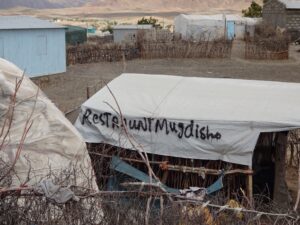Researchers helping researchers
Built by researchers for researchers, this website aims to offer a forum in which scholars with limited ability to conduct traditional fieldwork can help each other to identify and capitalize on the data-gathering opportunities, and explore and address the data-gathering challenges, involved in conducting “digital fieldwork”.
The site includes three kinds of content through which scholars can share ideas, insights, tools and techniques:
- Reflections: original and experiential contributions developed in a variety of media (photo essays, poems, artistic representation, audio, videos, prose, poetic, etc.) that consider “how-to” carry out, manage, or address challenges in conducting digital fieldwork; or offer intellectual reactions to the experience of conducting digital fieldwork.
- Resources: webinars and events, organizations and websites, trainings and workshops and collections of digital archival and news media resources related to digital fieldwork.
- References: lists of books, articles, and guides on digital fieldwork, within the context of the pandemic and beyond.

Photo credit: Lahra Smith
Traditional field research requires “being there”. Invaluable insights are gained, and complex dynamics understood, through the face-to-face interviews, everyday interactions, serendipitous meetings, and discovery of new sources of information that fieldwork makes possible.
The COVID-19 pandemic profoundly disrupted the conduct of field research. Since the pandemic’s emergence, many researchers have been unable to travel to their field sites, or have found that in-person research is unsafe and/or unethical. As a result, many scholars have had to, or will need to, adjust their research practices in order to advance their work. One strategy is to carry out research “digitally”, using emerging communication technologies, and capitalizing on the increasing availability of digital data. This web site aims to help scholars broaden their field research repertoires to include digital strategies.
While the pandemic was a key catalyst for developing the web site, we recognize that fieldwork has been, and will continue to be, out-of-reach for many scholars around the world for reasons that have little to do with the global health crisis that emerged in 2020. Scholars with limited research budgets often lack the resources to pay for the local or international travel, and other expenses, that fieldwork entails. Responsibilities related to teaching, administrative roles, children, elder care, and many other kinds of commitments also restrict scholars’ ability to spend time in the field.
In the context of these new and long-standing challenges, technological development and increased engagement with technology globally encourage and facilitate new ways of thinking about and conducting field research. Broadening our conceptualization of fieldwork to include digital techniques can democratize field research: understanding it as potentially digital, more scholars can imagine conducting fieldwork. Further, accessing digital historical archives, interacting with research interlocutors using digital platforms, and drawing on digital media can catalyze the development of new techniques for data generation.

Photo credit: Lahra Smith
As we develop new techniques for gathering data, however, new challenges and questions emerge. How can we protect both research subjects and researchers in the contexts and digital spaces in which we work? Whose voices will be silenced – and amplified – when fieldwork is conducted digitally? How does conducting human participant research digitally affect the process of gaining approval from Institutional Review Boards (IRBs)? Which technologies are safest? How can our on-the-ground experience with data generation inform our use of digital tools and techniques and help us overcome barriers to employing them? How can researchers determine when it is safe, ethical, and effective to resume on-the-ground fieldwork?
To date little training has emerged to help scholars wrestle with these questions. We hope this website will encourage dialogue about the nature of research in a digital age, and about how to accomplish our intellectual goals as ways of thinking about and accessing our research sites, participants, and materials evolve.
While we have very lightly vetted our content for quality, contributions reflect many perspectives, and we encourage users to read critically.
We invite you to meet the team and join us!